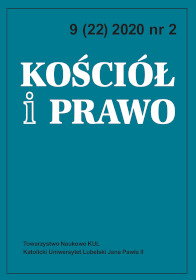Przepisy austriackiego prawa kościelnego w sprawach zakonnych od czasów cesarzowej Marii Teresy do konkordatu z 1855 roku
The Provisions of Austrian Ecclesiastical Law on Religious Matters from the Time of Empress Maria Theresa to the 1855 Concordat
Author(s): Robert KantorSubject(s): Law, Constitution, Jurisprudence, Canon Law / Church Law
Published by: Towarzystwo Naukowe KUL & Katolicki Uniwersytet Lubelski Jana Pawła II
Keywords: Austria; Austrian ecclesiastical legislation; Emperor Joseph II; monasteries; dissolution of the monastery
Summary/Abstract: One of the aspirations of Josephinism was to establish an autonomous national church, united with Rome. The “anti-monastic” trend in ecclesiastical politics in Austria has been part of fulfilling this task. The aim of the article is to set out the Austrian legislation (in this respect) concerning religious matters. It should be kept in mind that these are regulations issued by reigning emperors, not instructions, comments, recommendations issued by the Lviv Governium. Particularly noteworthy are the provisions of Maria Theresa and Joseph II. The former highlighted not only the sovereignty of the state over the Church, but also the supremacy and right of control of the Church in matters that should be the domain of civil authority. State interests were to be subordinated to all areas of life and institutions, including the religious. On the other hand, Joseph II, with his reform, covered the entire field of religious life, including the internal one, where he set about regulating too detailed issues. In his regulations, he wanted to separate orders from the influence of the Roman Curia, and to place them under the authority of national bishops over whom the government could exert more influence.
Journal: Kościół i Prawo
- Issue Year: 9/2020
- Issue No: 2
- Page Range: 217-235
- Page Count: 19
- Language: Polish

